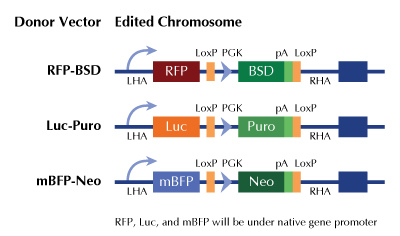PAK6 Human Gene Knockout Kit (CRISPR)
CAT#: KN207438BN
PAK6 - human gene knockout kit via CRISPR, HDR mediated
Functional Cassette: GFP-puro Luciferase-Puro RFP-BSD
HDR-mediated knockout kit validation
USD 1,657.00
4 Weeks*
Specifications
| Product Data | |
| Format | 2 gRNA vectors, 1 mBFP-Neo donor, 1 scramble control |
| Donor DNA | mBFP-Neo |
| Symbol | PAK6 |
| Locus ID | 56924 |
| Components |
KN207438G1, PAK6 gRNA vector 1 in pCas-Guide CRISPR vector KN207438G2, PAK6 gRNA vector 2 in pCas-Guide CRISPR vector KN207438BND, donor DNA containing left and right homologous arms and mBFP-Neo functional cassette. GE100003, scramble sequence in pCas-Guide vector |
| Disclaimer | These products are manufactured and supplied by OriGene under license from ERS. The kit is designed based on the best knowledge of CRISPR technology. The system has been functionally validated for knocking-in the cassette downstream the native promoter. The efficiency of the knock-out varies due to the nature of the biology and the complexity of the experimental process. |
| Reference Data | |
| RefSeq | NM_001276717, NM_001276718, NM_020168 |
| UniProt ID | Q9NQU5 |
| Synonyms | PAK5 |
| Summary | This gene encodes a member of a family of p21-stimulated serine/threonine protein kinases, which contain an amino-terminal Cdc42/Rac interactive binding (CRIB) domain and a carboxyl-terminal kinase domain. These kinases function in a number of cellular processes, including cytoskeleton rearrangement, apoptosis, and the mitogen-activated protein (MAP) kinase signaling pathway. The protein encoded by this gene interacts with androgen receptor (AR) and translocates to the nucleus, where it is involved in transcriptional regulation. Changes in expression of this gene have been linked to prostate cancer. Alternative splicing results in multiple transcript variants. [provided by RefSeq, Dec 2015] |
Documents
| Product Manuals |
| FAQs |
| SDS |
Resources
Other Versions
| SKU | Description | Size | Price |
|---|---|---|---|
| KN207438 | PAK6 - human gene knockout kit via CRISPR, HDR mediated |
USD 1,657.00 |
|
| KN207438LP | PAK6 - human gene knockout kit via CRISPR, HDR mediated |
USD 1,657.00 |
|
| KN207438RB | PAK6 - human gene knockout kit via CRISPR, HDR mediated |
USD 1,657.00 |
|
| KN407438 | PAK6 - KN2.0, Human gene knockout kit via CRISPR, non-homology mediated. |
USD 1,657.00 |
|
| GA111274 | PAK6 CRISPRa kit - CRISPR gene activation of human p21 (RAC1) activated kinase 6 |
USD 1,657.00 |
{0} Product Review(s)
Be the first one to submit a review






























































































































































































































































 Germany
Germany
 Japan
Japan
 United Kingdom
United Kingdom
 China
China
